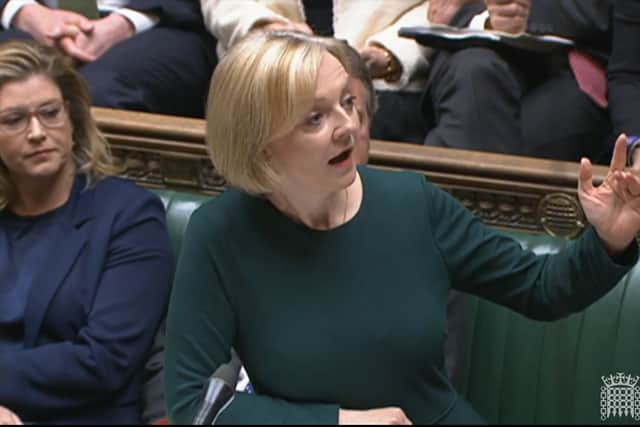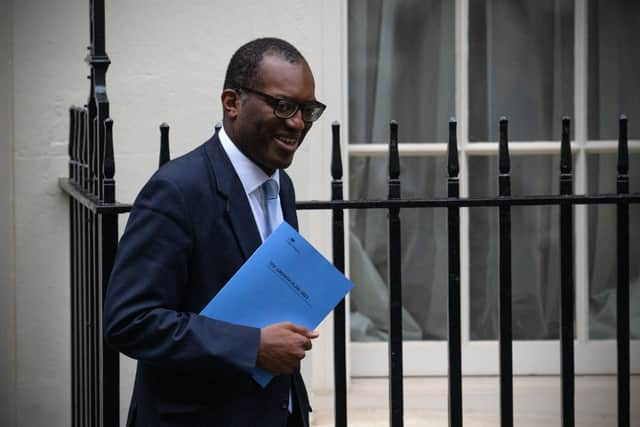Liz Truss PMQs: what did PM say today about public spending - how will plan work with £43bn of tax cuts?
and live on Freeview channel 276
Liz Truss pledged not to reduce public spending in her first PMQs since the government’s mini budget plunged the country into economic turmoil.
Labour leader Sir Keir Starmer quizzed her on the mini budget and mortgage rates before asking about her Tory leadership campaign pledge, when she stated that she would not reduce public spending. The Prime Minister firmly replied she “absolutely” would not.
Advertisement
Hide AdAdvertisement
Hide AdShe continued: “We are spending almost a trillion pounds of public spending. What we will make sure is that over the medium term the debt is falling. We’ll do that, not by cutting public spending, but making sure we spend money well.”
The Prime Minister’s comments are in stark contrast to what has been said by other members of her Cabinet - and many are also already questioning whether she will be able to uphold this commitment given the huge amount of debt the government is already in.
Her somewhat unexpected pledge also comes just weeks before Chancellor Kwasi Kwarteng is due to unveil a Medium-Term Fiscal Plan on 31 October, which he said will show how the government will return to “fiscal responsibility”. It has been widely expected therefore that this means public spending cuts, after markets reacted poorly to a £100 billion energy support package and £43 billion in tax cuts - all of which will be funded by government borrowing.
So, how do Liz Truss’ remarks contrast with what has been previously said - and more importantly, is her promise to not reduce public spending possible amidst all the tax cuts? Here’s what we know.


What have other MPs said?
Advertisement
Hide AdAdvertisement
Hide AdIn an interview with The Times, Levelling Up Secretary Simon Clarke said Britain had been living in a “fool’s paradise” and must reduce public spending to fund the government’s tax cuts. He criticised the UK’s “very large welfare state” and warned that Whitehall would have to “trim the fat”.
It came after the government attempted to reassure both the financial markets and the Conservative Party’s own MPs after the pound fell to a record low and the Bank of England was forced to launch an emergency bond-buying scheme in the aftermath of the Chancellor’s tax cuts announcement. The BoE’s Governor Andrew Bailey warned today there could be no further extension of the emergency market support beyond the end of the week, commenting: “My message to the (pension) funds involved – you’ve got three days left now. You have got to get this done. Part of the essence of a financial stability intervention is that it is clearly temporary.”
As a key ally of Truss, Clarke’s comments were taken by many as a reliable forecast of what was to come - but the Prime Minister has now contradicted this by saying she will not reduce public spending. In the wake of PMQs, a Downing Street spokesperson said “difficult decisions” will still need to be made.


Is it possible to not reduce public spending?
Despite it being what the public no doubt wants to hear - as families head towards a frightening few months as energy bills continue to soar and the NHS warns of winter difficulties - not reducing public spending may be impossible given the government’s recent tax cuts.
Advertisement
Hide AdAdvertisement
Hide AdThe Institute for Fiscal Studies (IFS) said it was not possible to deliver tax cuts on the scale of the Chancellor’s mini budget through efficiency savings. Instead, the organisation warned it would require £62 billion worth of cuts to public services - or raising taxes - to get the UK’s finances back under control and reduce or stabilise national debt.
In an online briefing, IFS Director Paul Johnson said: “The Chancellor should not rely on over-optimistic growth forecasts or promises of unspecified spending cuts. To do so would risk his plans lacking the credibility which recent events have shown to be so important.
"All that said, we would have sympathy with the Chancellor if he decided that the uncertainties of the present moment are too great to be promising specific future action around public spending. But the same would apply to his recent package of tax cuts. He should not apply that argument asymmetrically."
Analysts also warned that failure to come up with a credible plan that convinces the markets the government is committed to reducing its mountain of debt could result in a worse crisis than 1976, when the Labour Party’s government was forced to seek a bailout from the International Monetary Fund (IMF). They also warned that rising interest rates were likely to result in a “bruising” increase in unemployment.
Is Truss being clever?
Advertisement
Hide AdAdvertisement
Hide AdHowever some pundits believe Truss is actually just being clever with her phrasing. Public spending is set to increase due to the Government’s £60bn energy bills support package. Therefore she could argue that she is not cutting overall public spending, even if money is taken away from departments such as welfare and education.
Times columnist Hugo Rifkind tweeted: “Look. Surely when Truss says she isn't cutting public sector spending, what *she* means is that while vast cuts are indeed coming, the cost of the energy bailout means they'll still be spending more than before? Which is not a surprising thing for her to say. Even if it does somewhat play fast and loose with what most people mean by ‘public sector spending’.”
The Prime Minister’s spokesperson already appears to be pushing this line. He said that overall government spending will rise, largely because of energy bill subsidies, but added that "clearly there will be difficult decisions that need to be taken”.
If this is the Prime Minister’s interpretation of being “absolutely” committed to not cutting public spending, it will be up to voters and the markets to decide if they agree with her.
Comment Guidelines
National World encourages reader discussion on our stories. User feedback, insights and back-and-forth exchanges add a rich layer of context to reporting. Please review our Community Guidelines before commenting.
